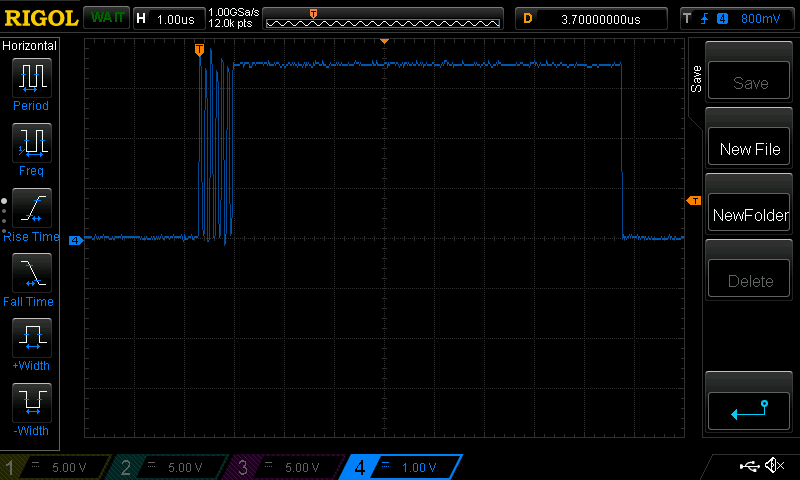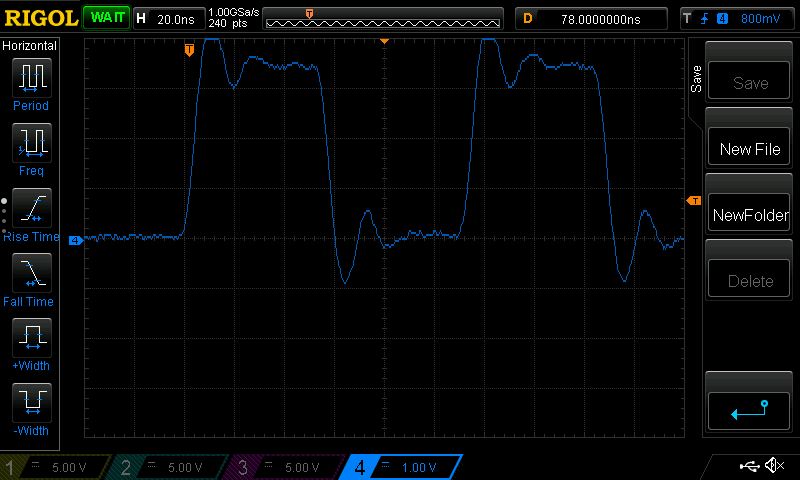-
Notifications
You must be signed in to change notification settings - Fork 3k
New issue
Have a question about this project? Sign up for a free GitHub account to open an issue and contact its maintainers and the community.
By clicking “Sign up for GitHub”, you agree to our terms of service and privacy statement. We’ll occasionally send you account related emails.
Already on GitHub? Sign in to your account
Timer.read_us takes 8.5µs, making wait_us unable to wait for less than that on Nucleo F103RB #7397
Comments
|
I applied the patch #7352 , re-compiled using the same settings and the results are the same. |
|
Hi @LaurentLouf [Mirrored to Jira] |
|
I don't think this PR will change something because it modifies the HAL_GetTick() which is only used by HAL_Delay() and not wait_us(). I changed a little bit your example and I did this instead: and the result is: Below 100us delay, the wait_us() is not precise. I don't know what precision we can expect with such low delays ? [Mirrored to Jira] |
|
Investigating a little bit further, the problems seems to come from So it basically comes down to that Since [Mirrored to Jira] |
|
@LaurentLouf What are your timing requirements ? |
|
@0xc0170 the core clock for this target is 72MHz, compared to 84MHz for the F4. I use the standard release profile ( If you check the results from @bcostm , you see that waiting 10µs already yields to an effective 24µs wait. So if I try to use |
@ARMmbed/mbed-os-hal Can you review these requirements? I do not see documented what shall we expect from wait API, only resolution. @LaurentLouf From the requirements your app has, I would use ticker API. In this case, us ticker should be used |
bump :-) Thx [Mirrored to Jira] |
|
@ARMmbed/mbed-os-hal Can you review these requirements? |
|
Software takes time to run, and that includes reading the time. At that clock rate, you're getting <=72 instructions in 1us. Almost any moderate piece of code will take a couple of microseconds. Maybe this platform timer read is a tad slow, but I don't think it's being unreasonable. Code that uses "wait_us(15)" to space things will always wait longer than 15us. The delay is a minimum, and it should normally be absolutely legal to run slow for any protocol that can be done using software-wiggling like this. In this case it seems you do need a maximum pulse. That is an unusual requirement for something using manual pin-wiggling. To achieve that I would suggest a software CPU loop, not a timer loop. I don't think the us_timer can be realistically be guaranteed that sort of precision. And you must be doing it with interrupts disabled. Unfortunately we don't have a There is a local |
|
I believe this is addressed by #10609 - |
|
Thank you for raising this detailed GitHub issue. I am now notifying our internal issue triagers. |
|
Ping @0xc0170 |

Description
Which produces
And more graphically

So I was investigating problems with timings, and one thing led to another, I realized that
timer.read_usandwait_usseem to be quite slow on my board. Since they both useticker_read_us, I guess the problem is somewhere there. Thing is, I've Googled and it seems this problem isn't widespread (one thing among others, it breaks OneWire timings, so there should be a few reports on that), so that may come from me, but the example code is pretty straightforward. Any idea ?Issue request type
[ ] Question
[ ] Enhancement
[X] Bug
The text was updated successfully, but these errors were encountered: